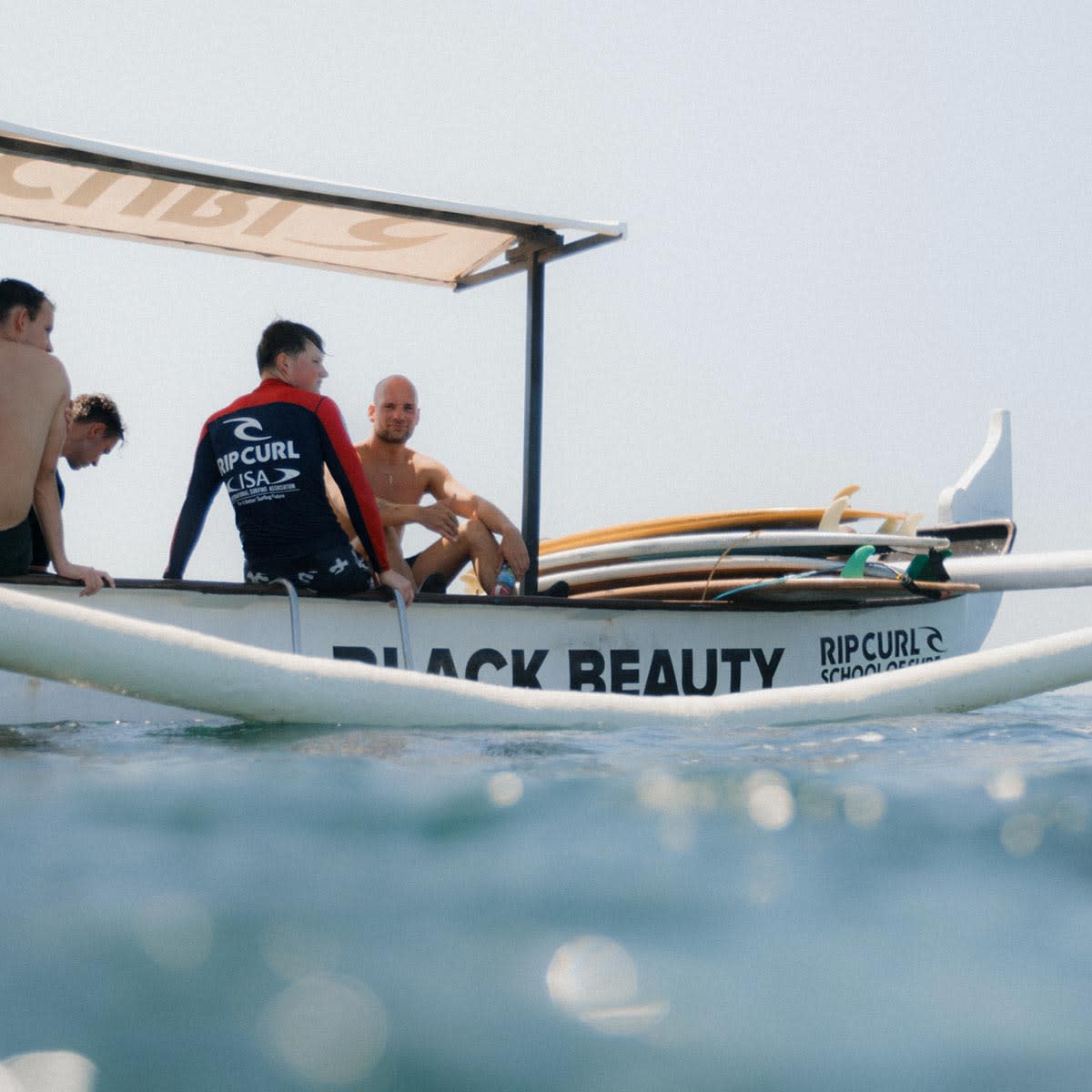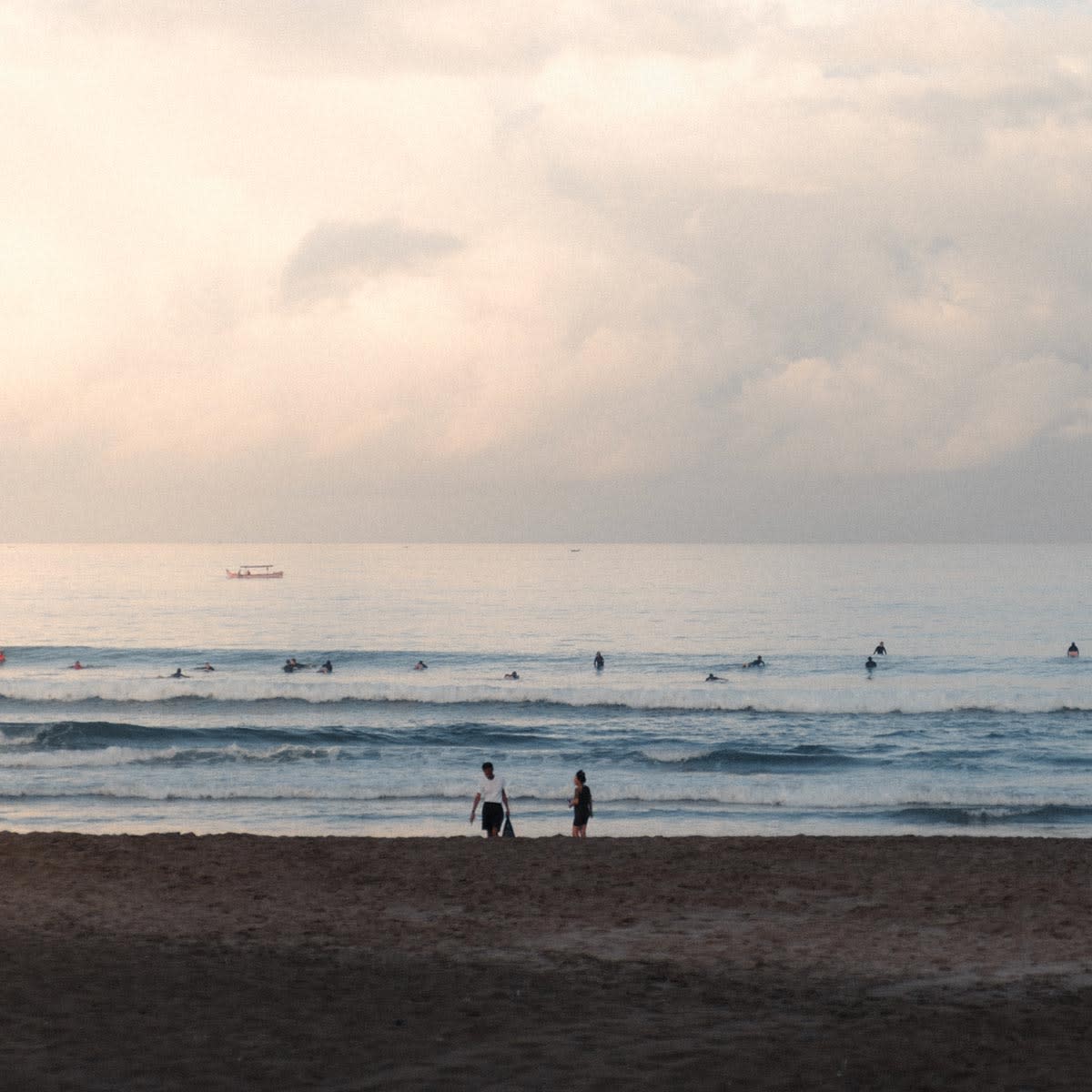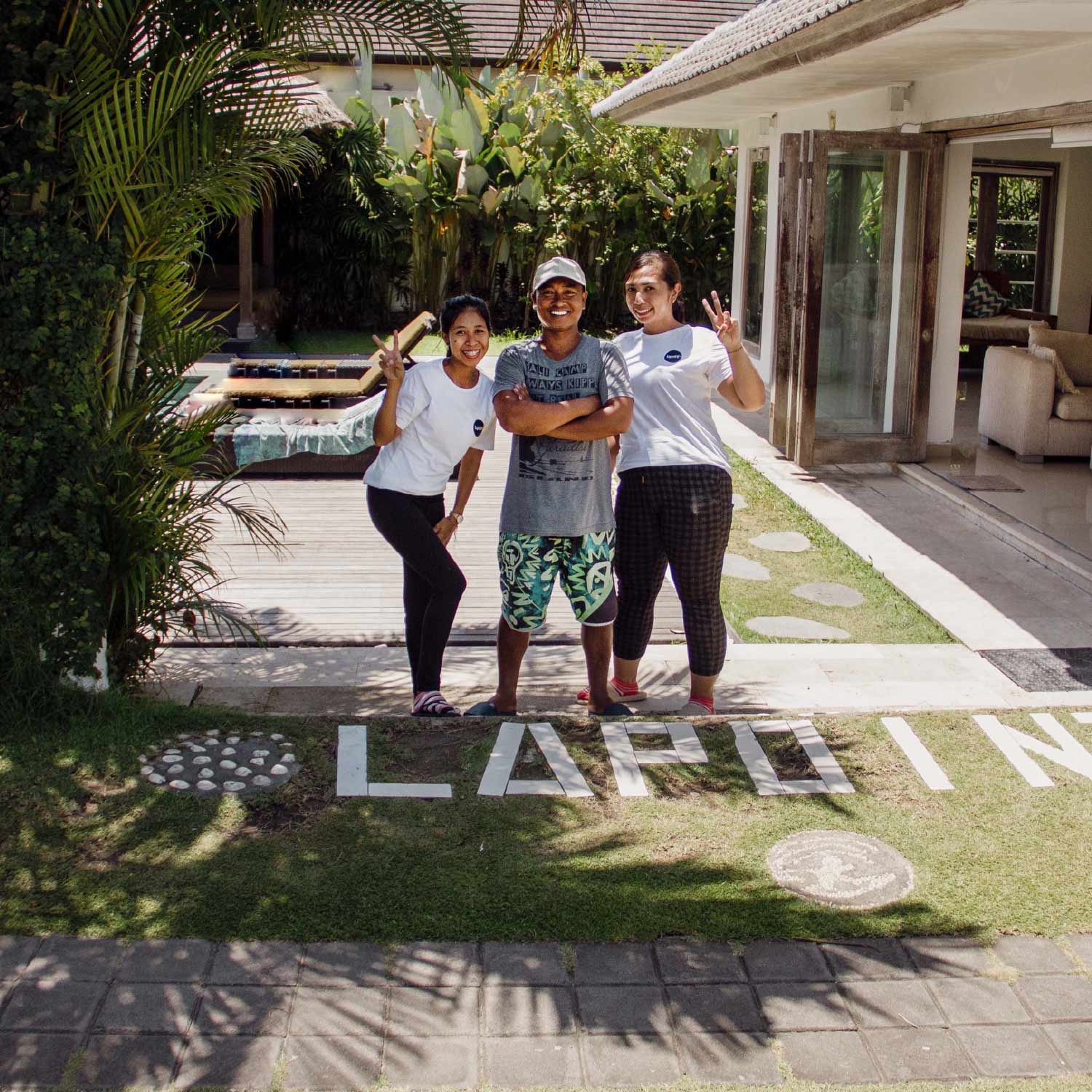
Surf CampCanggu, Bali
Surfing in Canggu, Bali - The ultimate surf guide
Bali is a highly-ranked surf destination on many surfers' bucket lists, and we sure understand the love and longing for this paradise island! Here’s our guide to what you’ll need to know to prepare for a surf trip of a lifetime. Bali has amazing food, stunning nature and great waves, what more than that can one ask for in a surf trip? Our Bali surf camp is located in beautiful Canggu and here’s everything you’ll need to know before arriving!
Quick Indonesia facts: Things to know before you go

Official languages: Indonesian
Time zone: GMT+7
Currency: Indonesian Rupiah (IDR)
Capital: Jakarta
Population: Around 274 million people.
Religion: The majority of the Indonesian population is Muslim. Bali is a very spiritual island where people with different faiths coexist.
Electricity: 230 V is the voltage in Indonesia. The standard plugs are type C and type F.
Flag: 🇮🇩
Surfing in Bali: Everything you need to know about this world-famous surf paradise

Bali is a famous surfing location and a bucket list destination for many surfers all over the globe. With Lapoint, you’ll surf with our local instructors who grew up surfing in the beautiful waves of Bali. The island offers something for everyone, whether catching your first wave or seeking barrels.
Read more about our surf courses in Bali here
Seasons and surf conditions: When is the best time to surf in Bali?

The seasons in this tropical island are characterized by two distinct seasons: the dry season and the wet season. Bali offers sunny weather all year, but naturally, there is some variation in seasons. The dry and wet seasons offer unique experiences, from sunny days perfect for outdoor adventures to lush landscapes brought to life by tropical rains.
Dry season (summer): April to September
Wet season (winter): October to March
Dry season conditions: Clear skies and bigger swells
The dry season is considered the best time for surfing in Bali, with clean conditions and bigger and more consistent swells coming in from the Indian Ocean. The dry season offers perfect waves for all levels but is especially nice for intermediate and advanced surfers.
The days are typically warm and dry with clear skies, which also means that the dry season is the peak season for tourists to visit the island.
Wet season conditions: Refreshing rain and less crowds
The wet season brings more tropical rain and occasional thunderstorms. It usually only rains for a few hours in the mornings and afternoons (which can be quite refreshing after a long day in the sun!). The rain also makes the lush, green landscape thrive and come alive, making it the perfect time to explore the jungle, waterfalls, and rice fields.
The wet season still offers many surfing opportunities, but the waves may be a bit more unpredictable. The swells are smaller than during the dry season, making it a nice time for less advanced surfers to visit. This is also considered the low tourist season, which means fewer crowds in the surf spots!
When is the best time to surf in Bali for my level?
With warm waters and great waves year-round, Bali is a paradise for surfers of all levels. The dry season offers clean, powerful waves, ideal for more experienced surfers, while the wet season is quieter, with smaller, more manageable waves. Thanks to Bali’s variety of surf spots and expert coaching, there’s always a wave that suits your needs, no matter the season and your level.
What’s the vibe like in the water?

The vibe in the water while surfing in Bali is most often laid-back and inviting to surfers of different skill levels. However, since it's a very popular surfing destination, it can also get quite crowded. If you respect the local customs and your fellow surfers in the lineup, you’ll get your waves!
Surfboard recommendations: Which surfboard should I bring to Bali?

Bali offers a variety of waves, so there are many options for which board you want to ride on! We have a nice selection of boards in our quiver at the camp, but if you want to bring your own board, we would recommend:
Shortboard: Bring your shortboard if you want to ride Bali’s fast and hollow waves. It’s a good choice to bring a nice performance board to catch the waves that break quickly and steeply. And not to forget, for barrel riding!
Fish: A fish surfboard is a nice choice to be prepared for Bali’s versatile waves.
Longboard: Bali offers nice surf spots with gentle and mellow waves that are ideal for gliding in on a longboard. Bali’s long waves offer some great noseriding opportunities!
Local weather: Sunny days and tropical water

Bali is a tropical island with nice temperatures from January to December. Even though it's a nice destination 365 days a year, it’s good to be prepared that the trip might look different depending on which month you’ll arrive.
Air temperature: Bali generally experiences tropical weather, with temperatures varying from around 26°C to 32°C (79°F to 90°F) throughout the year.
Water temperature: Due to its location near the equator, Bali's water remains relatively warm and consistent throughout the year. It’s usually somewhere between 26 °C and 29°C (79°F and 84°F).
The dry season is when the air and water temperatures are typically at their warmest. During the wet season, the air temperatures remain warm while the water temperatures may be slightly cooler.
Regarding wetsuits and swimwear: What should I wear while surfing in Bali?
Although there's no need for a wetsuit while surfing in Bali’s tropical climate, there are still some things you should consider wearing to keep yourself protected in the water:
Swimwear: In Bali, you can always surf in swimwear; no wetsuit is needed at any time of the year.
Rashguard: Protect yourself from sunburn and rashes by wearing a rashguard.
Leggings and a long sleeve: If you need additional coverage from the sun’s rays and to save your knees from rashes from the surfboard.
Surfing hat: Protect your face, ears and neck from the sun with a hat (preferably with a chin strap so it stays secure).
Reef shoes: Stepping on sharp reefs, rocks, or sea urchins may spoil your whole surf trip. Protect your feet by wearing reef shoes!
Surf safety: What should I be aware of?

While surfing in Bali is a great experience, there are a few things that you need to be aware of to make sure that your surf session is an enjoyable and risk-free one.
Long rides …in traffic: Be ready that some of your longest rides in Bali may be in a car on your way to the surf spot.
Water conditions: Be mindful of shallow reefs, sea urchins and big tides.
Local hazards: Be aware of the other surfers in the water, avoid getting in the way of the experienced riders, and keep an eye out for the beginners and their big boards.
A final note on surfing in Bali: Unforgettable waves well worth the traffic jams to the beach

Are you ready to catch some of the best waves in the world in stunning tropical waters? Surfing in Bali promises unforgettable rides for surfers of all levels, and the waves awaiting you make sitting through the occasional traffic jams to reach the beach completely worthwhile.
Lapoint Surf Camp: Where should I stay in Bali?

Is it finally time to make the dream of surfing in Bali into a reality? Amazing! But where on the island should you live during your stay? Our favorite place in Bali is Canggu, which is why our beautiful surf camp is located there. Canggu is a buzzing town with many surf shops, fun bars, ricefields and amazing restaurants and cafes. The beaches Old Man’s and Batu Belong beach are both just a few minutes walk from the camp. This town has everything you’ll need and more to have a great surf holiday!
Traffic and transportation: How to get around in Bali
The traffic in Bali is quite hectic with roads packed with cars and motorbikes. Be prepared to spend some time in traffic jams in tourist areas like Canggu and Ubud, even short distances on the roads can unfortunately take a very long time.
Arriving and departing to and from the surf camp
Our surf camp is located roughly 40 minutes away from Denpasar International Airport (DPS), also called Bali Ngurah Rai International Airport, and you can get there by our Lapoint transfer by answering our welcome email when you have booked your trip. The transfer can pick you up at whichever time you want and the drive takes around 50 minutes.
Getting around in Bali
A popular way to get around on the island is to rent a motorbike, just make sure that you wear proper shoes and protection. Many people drive the bikes in flip-flops or even barefoot, which will be extremely dangerous if you get into an accident. And don’t forget to wear a helmet! Riding the bike without a shirt is both dangerous and frowned upon.
Even short distances on the roads can take a long time. If the cafe where you’ll meet up with your friends is located ten minutes away, then it's a good decision to head over there 20 minutes before the set time. Rush hour is during the late morning and in the afternoon/early evening for tourists, when they head out for day trips and then again when they return from the trip. The local rush hour is early morning and afternoon/early evening.
Some cars offer snacks and water during long car rides, but it’s a good idea to bring some water and snacks with you just in case.
Delicious local food: What and where to eat in Bali
Food in Bali is amazing (this alone is a great reason to visit the island!) and you can find great cafes and restaurants close to the surf camp. There are many healthy options and many places are perfect to find both vegan and gluten-free dishes. You will also find warungs around Bali, a warung is a business (like a cafe, store or restaurant) that is family-owned.
Traditional Balinese and Indonesian food
Nasi goreng: A popular dish in Indonesia that consists of fried rice, vegetables and meats.
Babi Guling: Babi Guling, or pig roast, is a traditional Balinese dish.
Lawar: A traditional Balinese dish that’s made of mixed coconut, vegetable and meat.
Sambal Matah: A Balinese salsa that adds some spice to your meal.
Nasi Jinggo: A simple but delicious dish that consists of rice, chicken, noodles and sambal goreng.
Sate lilit: One of Bali’s signature foods, minced meat that’s wrapped around a stick made out of lemongrass or bamboo.
Nasi Campur Bali: A rice dish served with different vegetables, meats and other sides on a banana leaf, usually together with sate lilit. There are often three variants of the dish: nasi campur ayam (with chicken), nasi campur pedas (which is spicy) or the Bali classic nasi campur babi that is with Babi Guling pork.
Rujak Buleleng: A fresh and spicy fruit salad that contains fruits and vegetables like jicama, guava and mango.
Es Daluman: A coconut drink that is made with palm sugar and green jelly from Dalumen leaves.
Where to eat in Bali?

Enjoy traditional restaurants and trendy cafes around Canggu, here are some of our favorites:
Shady Shack
Crate Cafe
Secret Spot
The Shelter
Warung Local
Packing: What should I bring for my Bali surf trip?
A common mistake for travelers coming to Bali is overpacking. Trust us, you don’t want to be backpacking around the island with way more things than you’ll actually need during your trip. Here are some tips for what you should pack.
Passport
Proper shoes: Remember to bring a pair of good shoes if you are planning on renting a motorbike or going on a hike.
A first aid kit: It’s a good idea to pack a small first aid kit with you that contains antibiotics and painkillers since it’s easy to get “Bali's belly”, AKA symptoms like food poisoning.
Mosquito spray: Just like us, mosquitos love Bali! So don't forget the mosquito repellent at home.
Sunscreen: Bring sunscreen with high SPF and make sure that it’s ocean and reef-friendly. We sell zink at the camp.
Water bottle: We don't sell plastic water bottles at the camp, so remember to bring a reusable bottle with you. You can also buy an environmentally friendly bottle at the camp.
Light clothes: The temperature on the island is hot all around the year so bring light clothes and a hat to protect you from the sun.
Swimsuits and board shorts: You won't need a wetsuit while surfing in Bali, but bring swimwear that is fitting for surfing. You don't want your bikini or board shorts to fall off during your first wipeout!
Beach towel: We provide bath towels at the surf camp, but remember to bring a towel for the beach (or buy one at the local shops).
A raincoat: Bring an umbrella and a waterproof jacket you’re going to visit Bali during the wet season.

Sustainability
The beach is our home. We are leaving it better than we found it.
We have made a commitment to our ocean, beaches and community. They are our playground, our home and our livelihood. We are going to leave them better than we found them. That means that all our employees, friends and guests helps out with recycling and taking other actions for the environment. Each week there are beach cleaning and recycling activities to ensure that our home stays the way it was supposed to be.
Lapoint